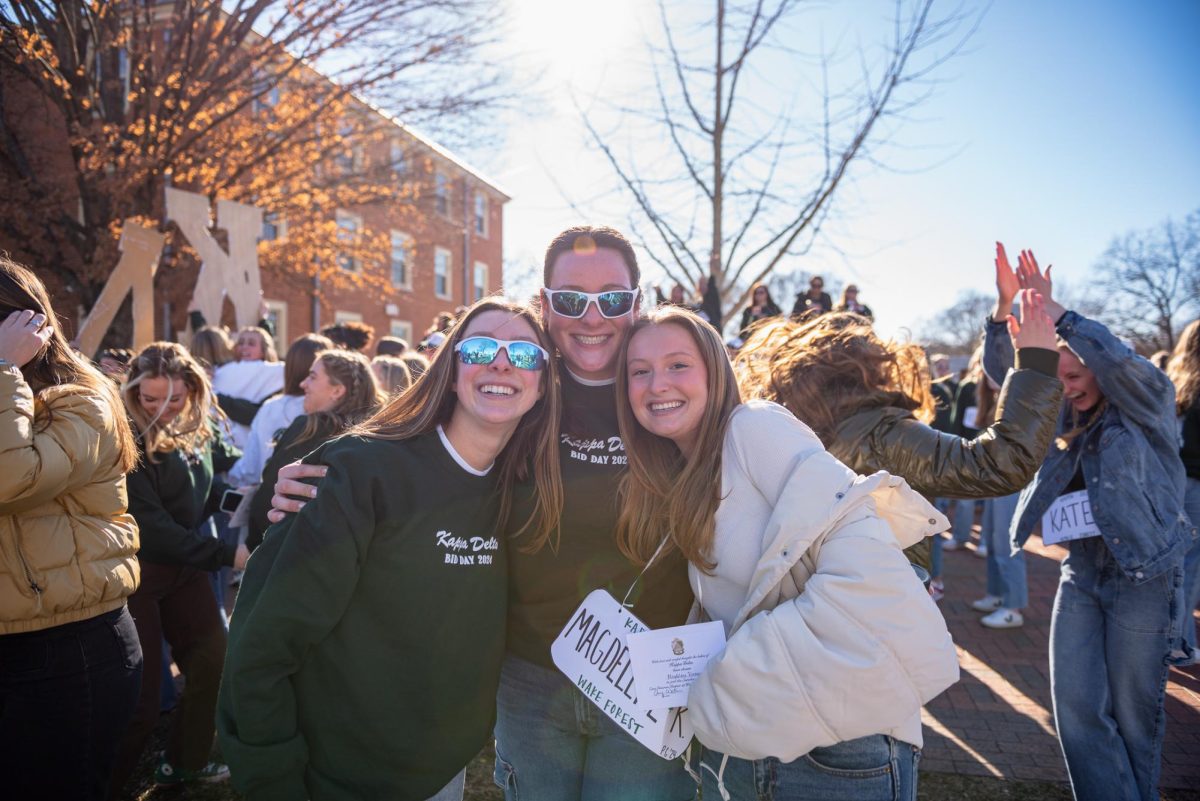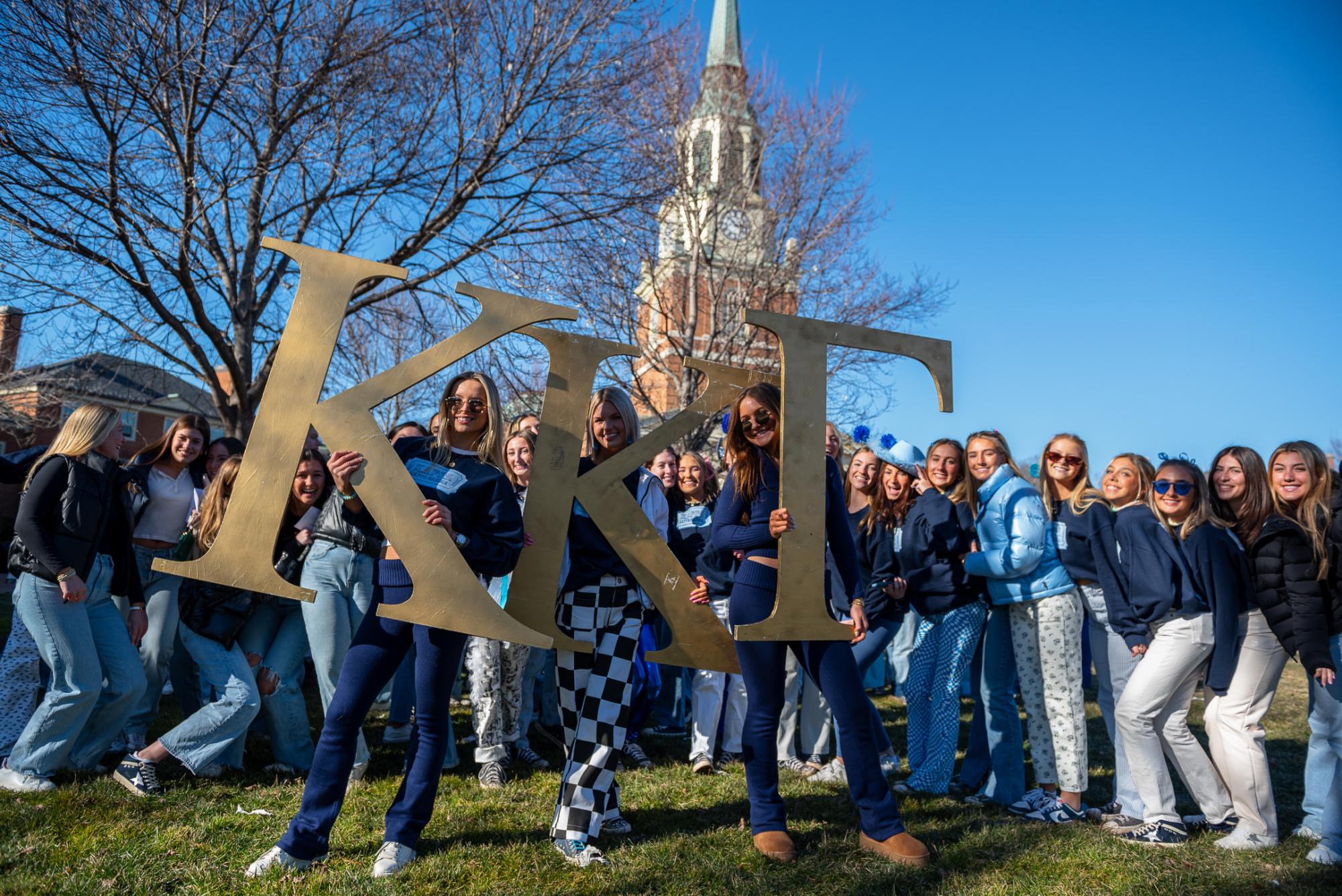Panhellenic recruitment remained partially on Zoom this year. Those on both sides of the rush process adjusted to what may be a “new normal” during formal recruitment from Jan. 10 to Jan. 21.
Before 2021, the concept of utilizing Zoom to participate in recruitment activities was a foreign concept to individuals in the Panhellenic community. However, this new generation of sorority members knows no different. In 2021 and 2022, the process was shifted to a completely virtual format due to COVID-19 restrictions enforced by the university. The Panhellenic community returned to partially in-person recruitment in 2023.
Although most COVID-19 restrictions have been lifted on campus, Panhellenic Recruitment remains one of the few organizations on campus that has not returned to full in-person activities. While the chapter introduction and philanthropy rounds were conducted virtually via Zoom, the Panhellenic community was able to gather in person for the subsequent three parts of recruitment: sisterhood, preference and bid day.
According to Delta Delta Delta Recruitment Chair Olivia Morano (‘24), there were organizational reasons for recruitment remaining partially virtual. The number of women participating in recruitment, as either an active member or potential new member (PNM), constitutes a significant portion of the campus. Returning to campus on the first day of formal recruitment would require Wake Forest to begin operations before the end of winter break.
“The recruitment teams were under the impression that being fully in-person for recruitment required turning on-campus facilities and services one week prior to the normal academic calendar,” Morano said. “To my knowledge, Wake Forest did not want to turn on facilities an extra week before everyone got here.”
Some participants are eager to return to a fully in-person experience. Morano expresses that in-person recruitment has a much more personal nature to it.
“It’s difficult to fully experience recruitment online,” Morano said. “A huge part of sisterhood is being able to connect with the girls by feeling the energy in the room.”
Conversely, Kappa Delta Recruitment Chair Anna Gramling (‘24) said that Zoom is a pivotal improvement to the process. According to her, it is difficult to be engaged in conversation when over one hundred active members and PNMs are congregated in the same room. She expressed that the first and second rounds being held on Zoom facilitate a more intimate one-on-one conversation.

“I was standing on the floor watching our girls lean into their conservations and cup their hands,” Gramling said. “I am wondering if it would be worse having even more PNM’s in-person for rounds one and two.”
Chi Omega Recruitment Chair Emily Mann also expressed that she thinks hybrid recruitment is the most efficient. The recruitment process is structured so that the density of PNMs who attend each chapter’s events diminishes in each round.
“I think trying to get 600 girls in and out of rooms in Carswell, Benson and the gym would be a difficult feat for the recruitment teams,” Mann said.
From the perspective of those partaking in the rush process, partially virtual recruitment can be detrimental or beneficial.
Junior Kaitlin Diamond, member of Kappa Delta, expressed the difficulty of living in a different time zone in regards to the virtual rounds of recruitment.
“For people on the West Coast or internationally, it’s a lot more difficult, for example, the second round started at 8 a.m. and so that’s 5 a.m. Pacific Standard Time,” Diamond said. “I think that [the recruitment process] would be more efficient, but there needs to be some more leniency with people who are having to wake up that early.”
The spread of students across the country adds another layer to an already complex process.
Recruitment divides PNMs into groups, which are assigned Gamma Rho Chi (GRC) members, who are essentially recruitment counselors for women going through the process. Each GRC is a member of a sorority, however, she is disaffiliated from her chapter during the recruitment timeline to prevent conflicts with potential new members. The hybrid format also impacts GRCs as they are responsible for administrative responsibilities as well as helping the PNMs decide which chapter suits them best.
GRC Jayne Flynn said that the PNMs must be on-campus for the recruitment process to work effectively.
“I definitely think it’s important for the potential new members to be in-person for rush during the last few rounds,” Flynn said. “Being back on campus helps them really envision themselves in each chapter.”
GRC Jess Campbell shared a different perspective and said that virtual recruitment may actually have a more favorable effect on the potential new members.
“I think being on Zoom for the first few rounds is good for the potential new members,” Gamma Rho Chi Jess Campbell said. “Recruitment can be a really stressful process, so having family and friends at home as an extra layer of support is really helpful.”
Despite the varying reactions to the continued hybrid recruitment model, from active members with responsibility to potential new members, the desire for balance is shared by many.
“Being in person allows you to connect with someone a lot better, but at the same time girls are really really nervous,” Diamond said. “Being at home kind of takes that stress away because you don’t have to worry about being surrounded by everyone who’s doing rush with you.”














